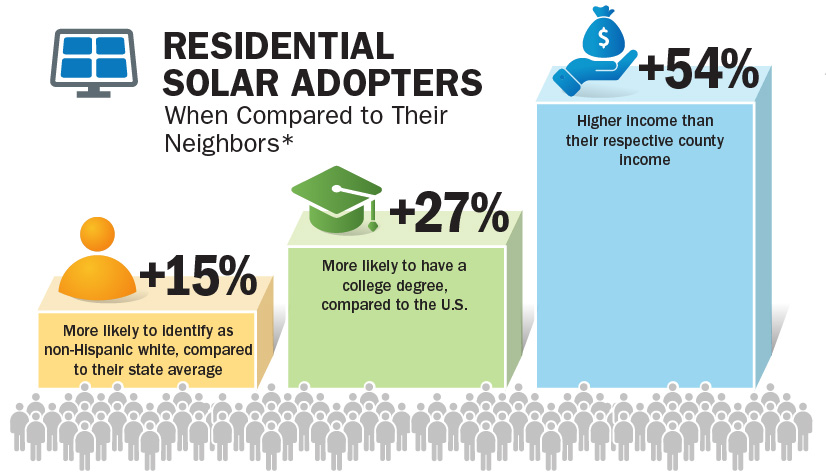Energy Justice in Solar Adoption
To help communities and organizations advance energy justice and equity in solar adoption, NREL’s research and analysis has yielded a range of resources.

Together, NREL’s solar research and analysis further the lab’s energy justice mission to prioritize equitable distribution of social, economic, and health benefits and burdens across all segments of society. NREL solar researchers partner with communities and community-based organizations to better understand how solar energy can meet their needs and to help remove barriers that have prevented equal access to solar energy opportunities. Concurrently, NREL’s solar energy analysts publish a wide variety of guides, technical reports, fact sheets, and tools to support equity-driven planning and decision-making to implement equitable solar solutions.
NREL designed these energy justice resources to benefit various solar adoption stakeholders.
Local Governments
Counties, cities, and other authorities having jurisdiction over local decision-making.
Tribes
American Indian or Alaska Native Tribes, Tribal energy development organizations, and other Tribal groups.
State and Federal Policymakers
Agency or department staff and lawmakers at the state and federal levels.
Utilities
Electric utilities and utility regulators.
PV Developers
Entities that develop or operate utility- and residential-scale PV systems.
Community Organizations
Local nonprofits, houses of worship, and other community-focused groups.
Energy Justice Resources
| Resource Title | Resource Type | Description | Stakeholder Type |
|---|---|---|---|
| Affordable and Accessible Solar for All: Barriers, Solutions, and On-Site Adoption Potential | Publication | Details barriers to affordable solar access, modeling methods for on-site solar adoption, and strategies that may be used to address challenges in solar adoption for low- and moderate-income households. | State and Federal Policymakers, Utilities |
| Low- and Moderate-Income Solar Policy Basics | Webpage | Summarizes policy options to support energy justice initiatives, including a list of free resources for local governments and other organizations looking to adopt solar and other clean energy solutions. | State and Federal Policymakers, Local Governments |
| National Community Solar Partnership — U.S. Department of Energy | Program | Provides funding and research to implement community solar solutions; and aims to expand access to affordable community solar options to communities that will benefit from reduced energy burden, increased energy resilience, community ownership, and equitable workforce development. | State and Federal Policymakers, Local Governments, Tribes, Community Organizations, Utilities, PV Developers |
| Solar Energy Innovation Network | Program | Assembles teams of stakeholders from communities to develop transformative solutions for adopting solar energy, including equity in underserved communities. | Community Organizations, Utilities, Tribes, Local Governments, PV Developers |
| Solar Energy Innovation Network — Assistance for Early Adopters | Technical Support | Offers targeted technical assistance to help communities and organizations across the country adopt and apply insights. | Community Organizations, Utilities, Tribes, Local Governments, PV Developers |
| Solar Energy Innovation Network — Publications | Publication | Publications produced for the Solar Energy Innovation Network program. | Community Organizations, Utilities, Local Governments, PV Developers |
| Solar Power in Your Community: A Guide for Local Governments | Publication | Provides ideas to support the growing interest and need for equitable solar solutions at the local level, including tips on how to implement programs and specific examples from all over the United States that highlight local communities' experiences enacting solar strategies. | State and Federal Policymakers, Community Organizations, Local Governments |
| SLOPE: State and Local Planning for Energy | Data or Tool | Enables state and local energy stakeholders to make data-driven decisions about clean energy, including building more equitable access to the benefits of a clean energy economy and ensuring affordable solutions for communities that are over-burdened by energy costs. | State and Federal Policymakers, Local Governments |
| SolarAPP+: Solar Automated Permitting Processing | Data or Tool | Eases the solar permitting process, which can be a major barrier to underserved communities, making it faster and cheaper for homeowners to go solar by decreasing solar soft costs. | Local Governments, Tribes |
| National Community Solar Partnership Technical Assistance — U.S. Department of Energy | Technical Support | Supports the rapid deployment of affordable and accessible community solar through free, rolling technical assistance. | State and Federal Policymakers, Local Governments, Tribes, Community Organizations, Utilities, PV Developers |
| Tribal Solar Initiative — Midwest Tribal Energy Resources Association | Program | Aims to reduce barriers to solar sdoption on Tribal lands, including identifying and addressing regulatory hurdles with input from regulators, utilities, and Tribes. | Tribes, Utilities, State and Federal Policymakers |
| American-Made Solar Prize — U.S. Department of Energy | Prize, Funding | Spurs U.S. solar innovation through a series of contests that accelerate the entrepreneurial process, including the Justice, Equity, Diversity, and Inclusion Challenge. | PV Developers, Community Organizations |
| The Sunny Awards for Equitable Community Solar — U.S. Department of Energy | Prize, Funding | Recognizes community solar projects and programs that increase equitable access to the meaningful benefits of community solar for subscribers and their communities. | PV Developers, Community Organizations, Local Governments, Tribes |
| Community Power Accelerator — U.S. Department of Energy | Funding, Technical Support | Connects developers, investors, philanthropists, and community-based organizations to work together to get more equitable community solar projects financed and deployed; funded by the U.S. Department of Energy. | Community Organizations, Local Governments, PV Developers |
| Solar Futures Study — U.S. Department of Energy | Webpage | Features key findings from a study exploring solar energy's role in transitioning to a carbon-free electric grid. | State and Federal Policymakers, Utilities |
Subscribe to Email Updates
For the latest research and publications, subscribe to solar market research and analysis email updates.
Contact
Share

